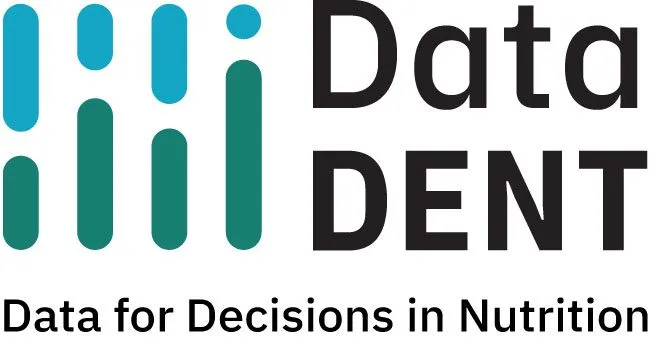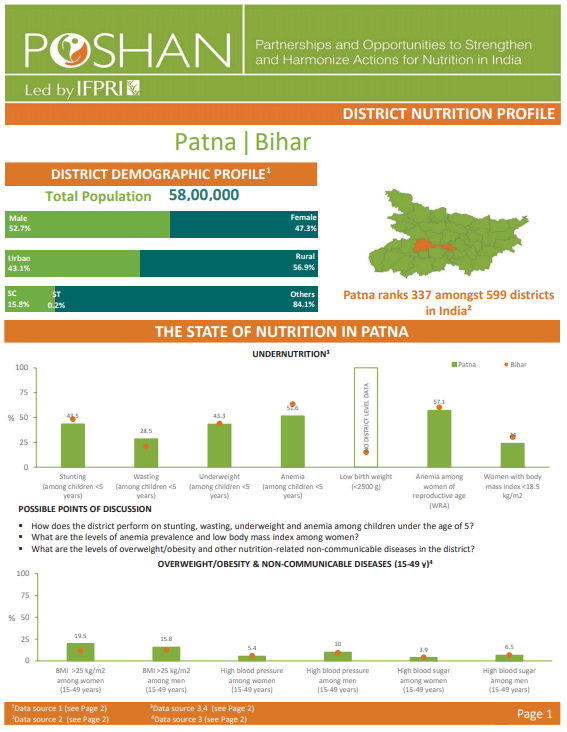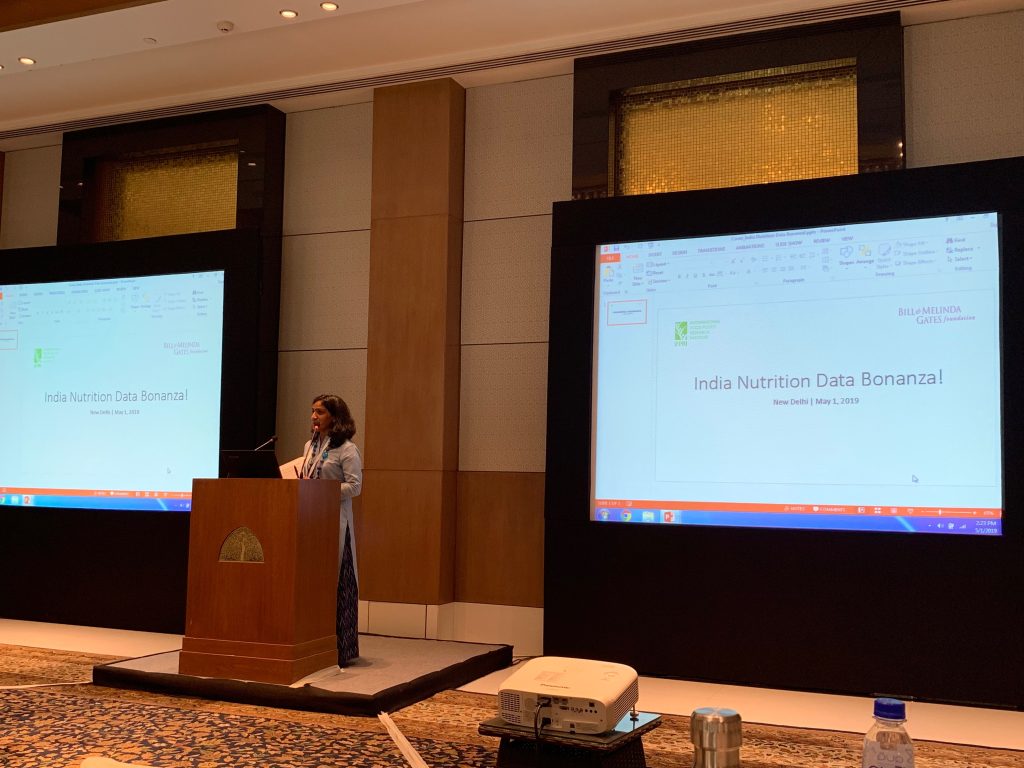
IFPRI’s Purnima Menon shares elements of the proposed nutrition monitoring framework for India
In order to support India’s robust policy framework for nutrition, it is imperative that the nutrition community converge on measurement metrics and programmatic actions. On May 1, the International Food Policy Research Institute (IFPRI) and Bill & Melinda Gates Foundation (“Gates Foundation”) co-hosted the India Nutrition Data Bonanza in New Delhi to discuss experiences and explore opportunities for collaboration along the nutrition data value chain in India. The event was held as part of Data for Decisions to Expand Nutrition Transformation (DataDENT) and Partnerships and Opportunities to Strengthen and Harmonize Actions for Nutrition in India (POSHAN). The half-day event convened around 40 nutrition stakeholders from 15 organizations and was a unique opportunity to reflect on collective action to strengthen measurement of nutrition intervention coverage in India.
What is the nutrition data value chain?
The India Nutrition Data Bonanza was structured around the nutrition data value chain. The nutrition data value chain focuses on data prioritization, collection, curation, analysis, and communication. Fragmented and complex, the nutrition data value chain presents challenges for researchers, development organizations, and policy makers.
During the event, Gates Foundation Senior Program Officer Rahul Rawat explained how each component of the data value chain is important to enable better decision making. Data is a value-added ingredient that allows us to describe the progress of nutrition but is also a crucial component of achieving goals. “It is not about quality, availability, and accessibility of data,” he said. “We need priority setting, building capacities at various levels, costed country data plans, innovation, and fostering a culture of data use and sharing.”
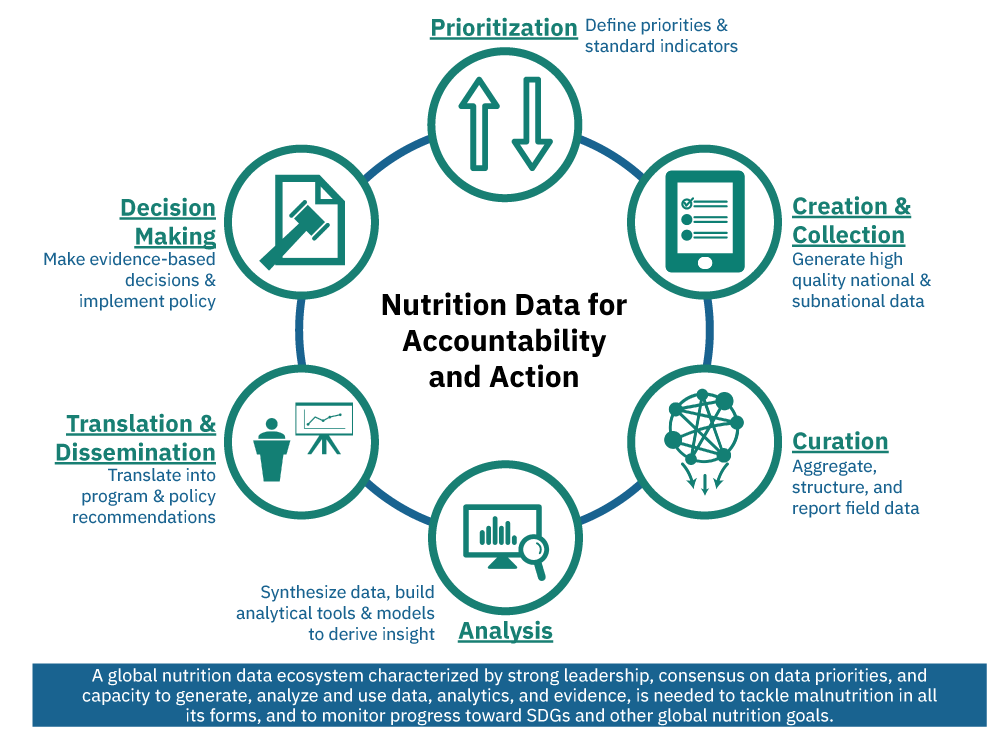
Data
The first session focused on data prioritization, collection, and curation of the data value chain. India has multiple data systems to collect nutrition data through population-based household surveys, third-party surveys and administrative data systems. Despite this, the challenge remains to ensure the availability of data on critical interventions. Differences in denominators across data sources, and measurement and reporting issues in administrative data sources makes it challenging to prioritize and monitor key nutrition interventions.
IFPRI Senior Research Fellow Purnima Menon presented a proposed nutrition monitoring framework for India that would enable improved monitoring at the national and sub-national levels and promote the use of data from multiple sources. She outlined the key components of the theory of change for POSHAN Abhiyaan, the Indian government’s flagship nutrition initiative: It focuses on improving capacities, using technologies, the convergence of multiple programs and behavior change communication—each of which is likely to have its own theory of change. In explaining how a simple theory of change for interventions could help district officials with problem diagnoses, Nitya Agrawal from IDinsight shared a monitoring framework approach from inputs to outcomes for iron and folic acid supplementation. Due to unavailability of data in existing nutrition data sources, she emphasized district officials to have access to multiple data sources—administrative data, national surveys and third-party surveys. IFPRI Research Fellow Rasmi Avula explained the challenges of maintaining data collection quality in the routine growth monitoring carried out by frontline workers.
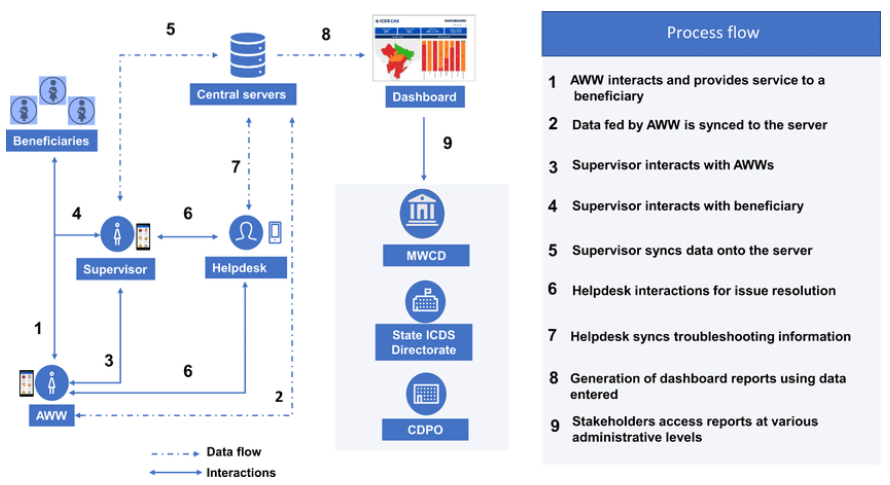
Flow of ICDS-CAS data from the Anganwadi Centre to Ministry of Women and Child Development. Nimmagadda S, Gopalakrishnan L, Avula R, Dhar D, Diamond-Smith N, Fernald L, Jain A, Mani S, Menon P, Nguyen PH, Park H. Effects of an mHealth intervention for community health workers on maternal and child nutrition and health service delivery in India: protocol for a quasi-experimental mixed-methods evaluation. BMJ open. 2019 Mar 1;9(3):e025774.
Analytics
The second session discussed initiatives around analytics element of the data value chain, specifically how the application of data analytics to data could inform better results. For instance, the recent implementation of ICDS-CAS (Common Application Software) by Ministry of Women and Child Development has led to the availability of service delivery data from frontline workers on a real-time basis. Ashutosh Tripathi of Fractal Analytics described various analytical solutions that could be deployed using ICDS-CAS data—hotspots, deep dives, outliers, breakouts, and predictive modelling—to strengthen service delivery. IFPRI Research Fellow Phuong Nguyen shared examples of missed opportunities in India based on the analysis of large data sets.
Evidence
The third session focused on how effective translation of findings could result in the use of data for program and policy decisions. In India, a growing number of data visualization tools (DVTs) aims to provide access to data in a visual format to facilitate its use and monitoring. IFPRI Program Manager Manita Jangid shared plans for a landscape study that aims to review 15 nutrition data visualization tools in India to understand how well they contribute to the nutrition data needs to inform evidence-based decision making. In another example of effective translation of data, IFPRI Communications Specialist Esha Sarswat shared the process and use of the POSHAN’s district nutrition profiles by district officials to diagnose bottlenecks. Clarity on data use scenarios at each level (national, state, district) is still needed in terms of data review by whom, frequency, and action.
Later, organizations shared case studies of data initiatives that cut across various elements of the data value chain. Manish Kumar of the India Health Action Trust shared the process of data collection, analysis, and action under Uttar Pradesh CBTS (community-based tracking system). CBTS is a periodic random and representative sample survey of a target population to measure trends in reproductive, maternal, newborn, and child health and maternal, infant, and young child nutrition indicators up to the block level, supported by the Uttar Pradesh Technical Support Unit. CARE India Technical Director Sridhar Srikantiah said that in Bihar, the process of collection and analysis of household data and other sources is changing in terms of priorities, strategies, and developing operational plans at various levels.
Next steps
The event concluded with a session on learnings and opportunities to strengthen actions across the nutrition data value chain in India. Gates Foundation Country Lead, Learning Systems, and Systems Evaluation Sanjeev Sridharan shared his perspectives on potential opportunities and challenges of data use and influence. He appreciated how the nutrition community came together for an evidence-based culture at scale with nutrition research, innovations in technology, infrastructure, and actionable data. All theories of change are incomplete, he said, pointing to the use of data for creating a local theory of sustainable impact. Gates Foundation Senior Program Officer Ellen Piwoz concluded the meeting by emphasizing how data can be used to improve efficiency, quality, effectiveness, and impact. In her presentation, she stressed the importance of coordination and interoperability to promote the use of data and address stakeholder needs. She noted that we need improved data collection mechanisms to address challenges around anthropometric data and missing data on critical nutrition indicators, such as low birth weight
As a next step, participants proposed creating a community of practice on nutrition information systems in India. This platform will bring together development partners to share their knowledge, evidence, and innovations on nutrition data.
View this blog on the POSHAN website here.
